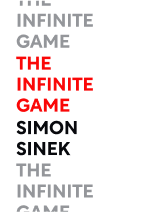

This article is an excerpt from the Shortform book guide to "The Infinite Game" by Simon Sinek. Shortform has the world's best summaries and analyses of books you should be reading.
Like this article? Sign up for a free trial here .
What is Simon Sinek’s The Infinite Game about? What is the key factor, according to its author, in sustaining long-term business success?
In The Infinite Game, Simon Sinek explores the differences between infinite and finite games. He walks you through how to develop an infinite mindset that will put you and your organization on a path for long-term success in business.
Here is a brief overview of the key concepts and ideas discussed in The Infinite Game by Simon Sinek.
Simon Sinek: Business Is the Infinite Game
In The Infinite Game, Simon Sinek applies James P. Carse’s concept of finite and infinite games to the domain of business. Sinek argues that people who view business as an infinite game are more successful. Those who aim to arrive at an ending “win” point do not end up as well-off as those who see their challenges as part of a larger game that is constantly evolving and never-ending.
Two Games: Finite and Infinite
Sinek defines finite games as those with known players, fixed rules, and an agreed-upon objective. A poker game, for example, has identifiable players, strict rules, and a pre-set ending point where one player is judged to have won and the players stop playing.
In contrast, infinite games have both known and unknown players, changeable rules, and no clear ending point at which one person is declared the winner and everyone goes home.
The biggest difference between finite and infinite games is this: When players leave a finite game, the game ends. When players leave an infinite game, the game continues on without them.
Examples of finite games include:
- Entertainment games: sports, card games, board games, and so on
- Wars
- Political elections
Examples of infinite games include:
- Friendships (no one “wins” being a friend and then stops having friendships)
- Careers (no matter how successful you are, you are never declared “winner” of your career)
- Parenting (there’s no way to “win” parenting and then stop parenting forever)
- Geopolitics (no country “wins” the world, after which all countries stop interacting with each other)
| The Inspiration for the Book Sinek started thinking about these concepts after reading James Carse’s Finite and Infinite Games, a philosophical treatise published in 1986, which contrasted the idea of a finite game (played to win) with an infinite game (played to keep playing). Carse applies these theories to many aspects of life, including parenthood, politics, sports, religion, and cultural interactions. He argued that while finite games promise wealth, status, and power, infinite games promise longevity. When it was published, Carse’s book received mediocre reviews, with some reviewers calling it unoriginal and uninspired. The book fell into obscurity until Sinek connected it to his theories on business management, bringing it back into the public consciousness. |
Business Is an Infinite Game
Sinek’s key insight on which he bases his book is that business is an infinite game:
- There are many players, some of whom you won’t even recognize as players, and many of whom enter and leave the game along the way.
- There are no fixed rules; other than being limited to legal behavior, there’s no formula or handbook for what you should do or how you should play.
- There’s no agreed-upon objective; one person’s goal will be different from another’s and neither is right or wrong. Further, there are multiple metrics for success, and they can be interpreted in various ways; for example, one realtor might claim to be everyone’s “favorite” based on customer satisfaction reviews, while another might claim to be the “favorite” because they have more regional offices.
- There’s no end. When a company goes out of business, other businesses continue, until they, too, step out of the game (at which time the game again continues on).
| Infinite Games Lay the Foundation for More Games Although Sinek brought renewed popularity to Carse’s ideas, he wasn’t the first to re-examine them. For example, in 2011, Kevin Kelly, founding executive editor of Wired Magazine and bestselling author, explored finite and infinite games as part of his book What Technology Wants. Kelly notes that finite games are dramatic (think military battles or football games) while infinite games can be boring—no one wants to read about a company that’s doing its job well or two countries at peace. However, the boring stories are the ones that lead to future stories. When people cooperate, they can create opportunities for others, whether that be new settlements where people can live and work, or new artistic collaborations that enhance the quality of peoples’ lives. In other words, people pay more attention to finite games and their dramatic storylines because they are fun and exciting. Therefore, people sometimes believe that these stories are the important ones—the stories (or games) that matter to the world. However, it’s infinite (boring) games that end up having greater consequences, spawning more games both infinite and finite. Kelly argues that technology is an infinite game because it can be the basis upon which other games are played: It can provide options and increase choices available to people as to how they will live their lives. |
Developing an Infinite Mindset
Sinek contends that someone who sees their business as part of an infinite game will make decisions based on long-term strategies that develop long-term strength, while someone who plays a finite game will aim for short-term wins that might weaken their organization in the long run. Consistently, businesses that succeed over many years are run by leaders with infinite mindsets, while businesses that fail are run by leaders with finite mindsets.
Sinek discusses several key differences in the attitudes and beliefs of finite and infinite mindsets:
- Winning versus playing: A finite-minded player plays to defeat others. In contrast, an infinite-minded leader plays to maintain a healthy position within a competitive field.
- “It’s about me” versus “It’s about us”: A finite-minded leader thinks only of herself and her own company, while an infinite-minded leader considers the impact her company will have on her employees, her community, the economy, and the outside world.
- Reactive versus proactive: Finite-minded players react to disruptions, while infinite-minded players anticipate them and proactively prepare for them.
- Short-term versus long-term goals: Finite-minded work to benefit their near-term bottom line, while infinite-minded players work toward a longer-term view of success. Ironically, infinite-minded companies often end up with higher profits even though they’re not focused as fixedly on their bottom line because their longer-term strategies pay off over time.
- Short-term threats versus long-term threats: Finite-minded leaders center their corporate strategies around responding to specific, definable threats posed by their rivals. Infinite-minded leaders focus on exploring opportunities or developing innovations that might strengthen their organizations.
- Stability versus resilience: Finite-minded companies try to weather storms. Infinite-minded companies aim not just to weather storms but to be made stronger by them. They are resilient rather than merely stable.
The History of Finite-Minded Businesses
To better understand why finite-mindedness is so prevalent in business today, we must look back at its history, and how it came to dominate our current business world.
Today, many people understand the purpose of business as serving and enriching a company’s owners, but this was not always how business was viewed. When modern capitalism was established some 200 years ago, it played a more holistic role in society; business owners once saw themselves as responsible contributors to a healthy society, rather than merely as beneficiaries of society’s wealth.
Eighteenth-century Scottish philosopher Adam Smith wrote in his seminal book The Wealth of Nations that the purpose of business was to serve the needs of the consumer. In other words, the company’s interests should be secondary to the customer’s interests. He acknowledged that businesses acted in their own self-interest but saw this as a force (he called it the “invisible hand”) working to ultimately serve the needs of the customer.
This attitude prevailed throughout the mid-twentieth century, when public corporations acted as equalizers, allowing average Americans to invest in and share in the wealth they created. Executives saw their role as one of stewardship, serving shareholders, employees, suppliers, customers, and the wider community.
Then, in 1970, Nobel Prize-winning economist Milton Friedman published an article stating that a company’s sole responsibilities were “to use its resources and engage in activities designed to increase its profits so long as it stays within the rules of the game.” Importantly, Friedman said that a company’s efforts should always be in direct service to its owners—its shareholders. Businesses started to value immediate profit gains over any other purpose. Sinek points to this influence as the cause of the rise of finite, short-term thinking that’s prevalent in business today.
Finite Thinking Leads to Short-Lived Companies
The rise in finite-minded thinking has been accompanied by a decrease in the average lifespan of a company. In the 1950s, a company lasted 60 years on average. Today, the average company lasts less than 20 years.
Sinek explains this by arguing that when companies focus exclusively on short-term profits, temporary stock prices, and immediate shareholder concerns, they engage in behavior that weakens them in the long run. For example, tying executive pay to short-term share-price increases leads executives to close factories, suppress wages, cut corners in production quality, and lay off workers. It might also pressure executives into showing constant high-speed growth, when it may be wiser to grow at a slower pace to strengthen the growth that the company has achieved. These actions may temporarily boost a stock price but often damage the company’s long-term strength.
Finite Thinking Leads to Societal Problems
Sinek draws a connection between the finite thinking of individual companies and societal problems, which can create a difficult environment for all companies to survive in. A “winners versus losers” mentality creates imbalances, such as the widening gulf between CEO pay and the median worker.
Large societal imbalances are unsustainable and lead to corrections. Disillusioned citizens support politicians with populist messages, many of whom promise “tear-it-all-down” solutions to rising inequality. Ultimately, this weakens the system as a whole and all companies operating within it, as companies can’t operate efficiently in an unstable society.
| The Debate on the Societal Implications of Finite Thinking To illustrate societal imbalances, Sinek notes that between 1978 and 2016, CEO pay increased by almost 950% while the pay of average workers increased by just 11%. Since the book’s publication, these statistics have grown even more dramatic: The Economic Policy Institute (EPI) reports that CEO pay increased by 1,167% from 1978 to 2019, during which time worker pay increased by less than 14%. (The EPI further notes that CEOs aren’t getting paid more because of increased productivity or skills—they’re paid more because they’re able to set their own salaries. The Institute gives several recommendations to counter this phenomenon, including increasing taxes and allowing other stakeholders in a firm to vote on executive compensation. Sinek doesn’t comment on specific policy tools that might rein in inequality through legal means. Instead, he recommends that leaders develop a fairer (more infinite) mindset that will lead to better governance and equality in the first place.) Critics of Sinek argue that he misunderstands the larger, societal role of finite thinking. Followers of Friedman-inspired market policies argue that capitalist societies are designed so that the short-term goals of individuals support a long-term healthy society: Individual, self-centered incentives raise everyone’s standard of living. For example, when a firm sells, say, pencils, they’re interested in their own individual profit. But the profit they make for themselves fuels a better economy for others as well: Not only do they provide a writing tool for students, artists, businesspeople, and so on, but they also provide jobs for the people involved in bringing that product to market: the manufacturers, salespeople, marketers, business development analysts, human resources workers, and others. The salaries these people make allow them to purchase products like cars and blenders that enable yet other people to earn salaries, raising the standard of living for the wider society as a whole. Further, Friedman himself argues that capitalist economies lead to less inequality than do underdeveloped economies or those based on legal hierarchies (castes, or class systems that are cemented into a society). Others, though, agree with Sinek that finite thinking in capitalist economies is inherently destabilizing. For example, Naomi Klein suggests in her book The Shock Doctrine that Friedman-style economic policies are so antithetical to a healthily functioning society that they can only be imposed on a country through political upheaval and violence. She argues that throughout history, when companies are allowed to prioritize their own benefit over anyone else’s, they create enormous wealth imbalances. These imbalances eventually lead to protests, which lead to government crackdowns, which lead to an erosion of citizens’ rights. For a deeper exploration of these subjects, read our guides to Friedman’s Capitalism and Freedom and Charles J. Wheelan’s Naked Economics. |
How to Lead With an Infinite Mindset
Sinek outlines these five guidelines to help you develop an infinite mindset and build a strong, resilient company:
- Advance a just cause.
- Build trusting teams.
- Study your worthy rivals.
- Be ready to pivot on a fundamental level.
- Demonstrate the courage to lead.
Sinek notes it’s important to adopt all five of these guidelines in order to achieve the full potential of the fully infinite mind.

———End of Preview———
Like what you just read? Read the rest of the world's best book summary and analysis of Simon Sinek's "The Infinite Game" at Shortform .
Here's what you'll find in our full The Infinite Game summary :
- Why businesses who see the game as finite don't survive
- How to develop an infinite mindset that will put you and your organization on a path for long-term success
- How the purpose of business is changing






